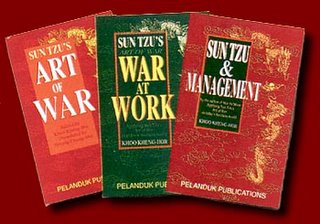
The ART OF WAR is the most referred to military warfare in history. It was written 2500 years ago some time between 300 and 500 BC by a Chinese military strategist cum scholar Sun Zi, now commonly known as Sun Tzu. His was a barbaric classroom when contrasted with the antiseptic lecture halls of today's WarStudies departments. Some people have erroneously judges the book by its cover so much so that they have deprived themselves of its learning opportunities. What they have failed to realise is that in Sun Tzu's era, China was splintered into many states that were often at war with one another.
Hence, Sun Tzu's ART OF WAR need not be a negative book. It could be POSITIVE as well. To use it positively, a person needs to have an open mind and be clever enuf to substitute some of the seemingly negative words used in the original context. An example is the word "ENEMY". Should you come across this word, dont think of an "enemy" as someone to watch out lest he /she brings you harm. Instead, substitute the word with "the person or the event you are dealing with." In this way, he could be your boss, your colleagues, employees, customers, spouse, children, a marathon race, etc.
To wit, this quotation from Sun Tzu:
If you know yourself and your enemy, in a hundred battles, you will never fear the result......
maybe rewritten as (if you are running a marathon):
If you know yourself and had train well, in a hundred races, you will never fear the result......

No comments:
Post a Comment